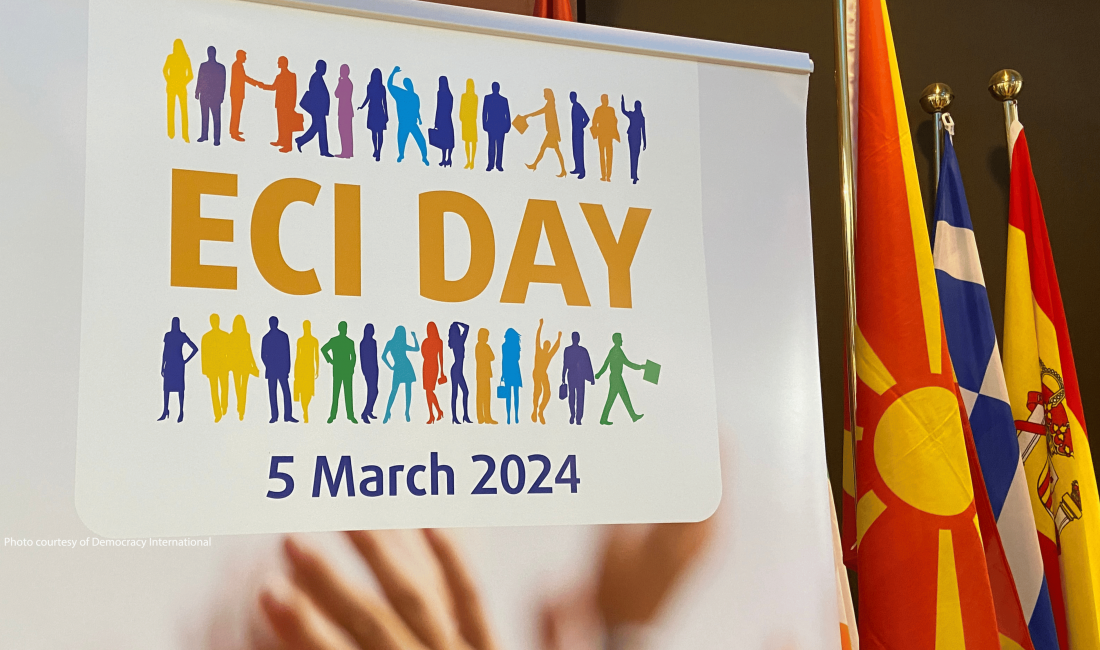The cornerstone of a well-functioning democracy lies in the extensive and robust participation of its citizens. Throughout the years, Europe has introduced various democratic instruments to facilitate citizen involvement such as introducing the new European Citizens’ Panels, public consultations, and its ambitious democratic project, the Conference on the Future of Europe.
However the only real, bottom-up instrument of citizens’ participation which allows citizens to mobilise and organise is the European Citizens’ Initiative (ECI) – the brain child of Democracy International’s founders in the early 2000s at the last European Convention, which empowers EU citizens to propose legislation to the EU by collecting one million signatures across at least seven member states. Today, it is still the world’s first and only transnational participatory democratic instrument to exist.
The ECI is also unique in another way. It has, arguably, the strongest support infrastructure for organisers and users than any other similar instrument in Europe. A consultation carried out last year by Democracy International on behalf of the ECI Forum confirms that no comparable citizens’ initiative instrument or petitioning instrument in Europe provides even half of the resources that the ECI provides in its support infrastructure. This includes the Central Online Collection System which facilitates the collection of online signatures, and the ECI Forum, which is the comprehensive support centre for organisers providing webinars, learning materials, success stories, guides, and the opportunity to ask experts for tailor-made advice on campaigning or legal issues.
As always with such instruments, the question is, what is the impact? Where has a political difference been made? One notable successes is the ECI ‘Right to Water,’ which led to the European Commission's EU Drinking Water Directive that went into effect in January 2021. Similarly, the 2019 successful ECI ‘End the Cage Age’ called for humane reform in farming practices, to which the European Commission responded positively, promising to take up nearly all of the organisers demands and present a legislative proposal by 2023. This was a huge celebration in the world of EU democracy! And in fact, it has likely led to a surge in even more ECIs being registered and reaching success, as suggested by Olga Kikou, organiser of ‘End the Cage Age’.
Regrettably, however, the Commission has not put forward its legislative proposal to the ‘End the Cage Age’ ECI in the timeline it promised, and it is showing signs of stepping back or indefinitely delaying its written commitment to the citizens.
This was precisely the topic of this year’s ECI Day, hosted by the European Economic and Social Committee, where Democracy International is one of the permanent partners. While ECI Day is an annual day dedicated to celebrate the ECI, this year, ECI Day, in particular, the opening high-level panel, was used to offer a sobering view about just how influential the ECI is in decision-making, and how it can become a more politically impactful instrument.
The ECI today, while a significantly more user-friendly instrument in the last 12 years of its existence, faces a significant challenge in terms of political implementation. The lack of political support, or lack of clarity of how the Commission will follow up to its own, now delayed, commitments on the ECI, not only undermines the credibility and effectiveness of the ECI but also perpetuates a cycle of disillusionment and disengagement among citizens. Without genuine political accountability, the ECI risks becoming a symbolic gesture rather than a meaningful mechanism for citizen empowerment and policy influence. This was sentiment shared by most panellists on the high-level session of ECI Day, including European Ombudsman Emily O’Reilly, Member of European Parliament Tilly Metz, Carsten Berg of The ECI Campaign, Olga Kikou of ‘End the Cage Age’.
In response to the legitimate concerns, Pascal Leardini of the European Commission acknowledges the complexity of addressing successful ECIs, especially those focusing on sensitive and controversial issues intertwined with broader ecosystems and value chains. ECIs like ‘End the Cage Age’ intersect with agricultural practices, necessitating thorough impact assessments to evaluate associated costs and transition periods.
To this we raise the question: what is the use for the six months allotted to the Commission to take a decision on a successful ECI, if not to review and carry out impact assessment? We also lately see a trend with successful ECIs where the Commission postpones taking a response, calling instead for further impact assessments, and indefinitely delaying its actual response to the topic matter raised by the ECI.
The ECI’s political problem does not lie with the European Commission alone; the European Parliament in fact rejected the Commission’s proposal for sustainable use of pesticides, as called for by the successful ECI ‘Save the Bees’ – highlighting that all institutions have a role to play in the ECI follow-up process and in ensuring the ECI is a politically impactful instrument. One solution to strengthening the European Parliament’s proactive role in successful ECIs is to amend its Rules of Procedure to have a resolution on each successful ECI after the public hearing. Additionally, the Parliament could conduct a thorough evaluation of the Commission's responses to successful ECIs, enhancing inter-institutional scrutiny and assessing the adequacy of the Commission's actions.
Understandably, however, the ECI today is an agenda-setting instrument, as emphasised by the Leardini himself, sparking vital conversations about how limited or powerful the ECI, and essentially the citizens, should have in EU decision-making. A proposal from both the European Parliament and the Conference on the Future of Europe is to convene an EU Convention, which should be held during the 2024-2029 EP mandate with the aim to amend EU treaties. This would thereby open the door to the European Parliament receiving the right of legislative initiative and therefore the authority to address ECIs directly. Additionally, the reform of the EU treaties could transform the ECI into a genuine citizens' right of initiative with more political backbone.
As we explore what the future of the ECI will look like, it's clear that the success of the ECI hinges on both technical improvements and political will from EU institutions. Regarding the former, the ECI has seen great maturity in its effort to become a more user-friendly instrument and supportive instrument for organisers. Regarding the later, its political impact, the ECI has the opportunity to take a step forward and produce stronger political success stories. For this, however, we’ll need the help of the EU institutions.




